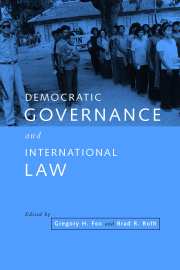Book contents
- Frontmatter
- Contents
- List of contributors
- List of acknowledgments
- Introduction: the spread of liberal democracy and its implications for international law
- PART I THE NORMATIVE FOUNDATIONS OF A RIGHT TO POLITICAL PARTICIPATION
- PART II DEMOCRACY AND INTER-STATE RELATIONS
- PART III DEMOCRACY AND THE USE OF FORCE
- PART IV DEMOCRATIZATION AND CONFLICTING IMPERATIVES
- 12 Intolerant democracies
- 13 Whose intolerance, which democracy?
- 14 Democratic intolerance: observations on Fox and Nolte
- 15 A defense of the “intolerant democracies” thesis
- 16 Democracy and accountability: the criss-crossing paths of two emerging norms
- PART V CRITICAL APPROACHES
- Index
14 - Democratic intolerance: observations on Fox and Nolte
Published online by Cambridge University Press: 04 May 2010
- Frontmatter
- Contents
- List of contributors
- List of acknowledgments
- Introduction: the spread of liberal democracy and its implications for international law
- PART I THE NORMATIVE FOUNDATIONS OF A RIGHT TO POLITICAL PARTICIPATION
- PART II DEMOCRACY AND INTER-STATE RELATIONS
- PART III DEMOCRACY AND THE USE OF FORCE
- PART IV DEMOCRATIZATION AND CONFLICTING IMPERATIVES
- 12 Intolerant democracies
- 13 Whose intolerance, which democracy?
- 14 Democratic intolerance: observations on Fox and Nolte
- 15 A defense of the “intolerant democracies” thesis
- 16 Democracy and accountability: the criss-crossing paths of two emerging norms
- PART V CRITICAL APPROACHES
- Index
Summary
The authoritarian German jurist Carl Schmitt once pointed out that “a philosophy of concrete life must not withdraw from the exception and the extreme case, but must be interested in it to the highest degree. The rule proves nothing; the exception proves everything.” In seeking to further specify the purported “emerging international right to democratic governance,” the authors of “Intolerant democracies,” Gregory H. Fox and Georg Nolte, have grasped the fundamental significance of the exception: the real meaning of a democratic norm cannot be understood without examining precisely those cases in which democratic values argue for a suspension of democratic processes. The question is whether the assertion of a meaningful international consensus on the “democratic entitlement” can withstand such an examination.
Once a pejorative term in the writings of the most esteemed political philosophers, “democracy” has in recent parlance been transmogrified into a repository of political virtues: rule ratified by a manifestation of majority will (popular sovereignty); orderly mediation of political conflict through participatory mechanisms (polyarchic constitutionalism); individual freedom under the rule of law (liberalism); broad popular empowerment to affect the decisions that condition social life (democracy, properly so called); et cetera. No term can mean so many things and continue to mean anything, for political virtues do not come in neat packages. No set of formal procedures can stand above the clash of competing priorities, nor can a cogent theory of democratic “primary goods” – things everyone wants, regardless of what else anyone wants – be crafted to avoid controversial choices that arise in the moments of crisis to which Schmitt referred.
- Type
- Chapter
- Information
- Democratic Governance and International Law , pp. 441 - 444Publisher: Cambridge University PressPrint publication year: 2000
- 1
- Cited by



